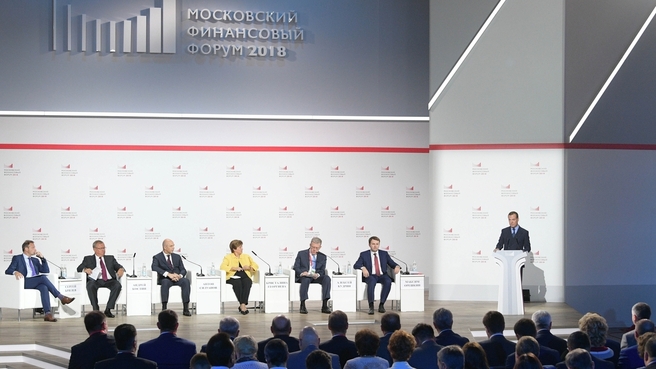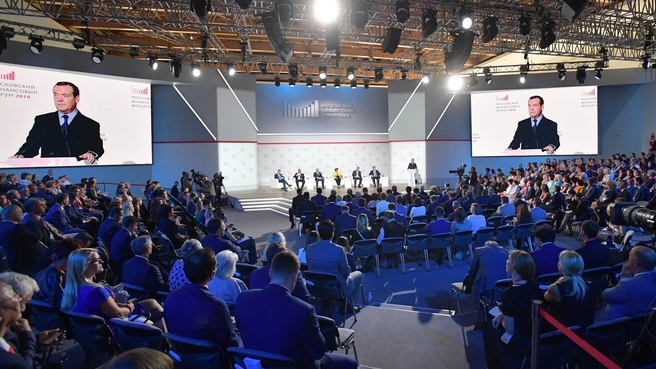Dmitry Medvedev gave a speech at the plenary session of the forum titled “Finances for Development: A New Platform for Stable and Balanced Relationships”
The Moscow Financial Forum is a unique platform for the professional discussion of Russia's financial policy. The mission of the Forum is to search for solutions that will make the Russian economy more competitive.
The Moscow Financial Forum was first held in the capital on September 23, 2016; since then, it has become a tradition for financial analysts to hold annual meetings in September to discuss topical issues and search for effective ways to tackle the financial issues facing the Russian economy.
This year the discussion will focus on mechanisms to achieve the targets set in the Executive Order on National Goals and Strategic Objectives of the Russian Federation until 2024, signed by the President in May of this year.
Excerpts from Dmitry Medvedev’s remarks at the forum’s plenary session:
Good afternoon, ladies and gentlemen.
I cordially greet everyone here at the Moscow Financial Forum. This is already the third forum and it is gradually becoming a prestigious venue for exchanging views on finances and the economy in general. The timing of the forum – on the eve of Moscow’s birthday – has also become a good tradition. This proximity allows us not only to discuss serious financial issues but also to see and feel the atmosphere of the pre-holiday capital.
We recently hosted the world’s football fans. I don’t doubt that many here watched the FIFA World Cup and saw how Moscow welcomed its guests. Naturally, we would like this atmosphere to take shape at the forum and prevail in finances even though finances are typically much harder to deal with than football.
This is a financial forum but the theme of this plenary session is much broader. This makes sense because today’s challenges are linked not only with money transfer issues but also with the economy in general that is affected by changes in global politics, trade, market conditions, and international competition. As you know, these changes aren’t always positive. It is in these conditions that we are supposed to make Russia one of the world’s top five economies. This goal was set in the President’s May Executive Order. This goal needs to be achieved through financial, tax and budgetary policy, among other things. We have created a solid foundation for further development over the past few years. Despite economic pressure, the sanctions and the various crises that have been shattering the global economy since 2008, we have restored growth in our economy. Let’s be straight –our growth rates are not at all great, but development is no longer accompanied by the accumulation of imbalances and external vulnerabilities like before, as on the scale it was before.
Our foreign national debt has reached another low, and industry is becoming more competitive. Import substitution is taking place in some segments and non-energy exports are growing with confidence, partly due to the more reliable financial sector.
Today, Russian jurisdiction suits the needs of business much better. I understand that there are still some concerns, but nonetheless it is a far more developed jurisdiction. The financial markets received key infrastructure – a single mega-regulator based on the Bank of Russia, as well as the central depositary. Protection from market manipulation through access to insider information has been tightened – a corresponding law was adopted. Money savings protection mechanisms are improving, including for mortgages.
Taxes for new businesses have been lowered, for example, corporate income tax rates for development centres with special status, for special projects. I mean the so-called TASEDs – territories of advanced social and economic development, special investment contracts (SPICs) and others. We moved to a “one stop shop” system for submitting accounting reports to state agencies. We are supporting the development of small- and medium-sized businesses where possible. All this helped us improve our Doing Business rankings to 35th. We shouldn’t get carried away by this, but it is an indicator that shows we’re moving in the right direction and making the right decisions.
We must move ahead. We are currently drafting the guidelines for Government activity for a period until 2024. These guidelines contain all tactical and strategic steps, including those for achieving the national goals outlined in the May executive order. But this document has broader implications. This means, in general, stable development with low inflation and increasing average incomes. This is the ongoing transformation of the economy towards non-raw materials sectors through support for digital technology, innovation development, highly technological infrastructures and other sectors.
I will briefly discuss certain aspects of this that I believe to be essential.
First, we intend, of course, to continue working to increase the inflow of investment. Not long ago, we adopted a corresponding plan of action on accelerating investment growth rates. Our target is 25 percent of GDP per year (the current level is 21 percent).
The plan of action includes measures designed to strengthen and improve the investment climate, reduce business costs, expand the introduction of our best practices in the regions, continue to reform control and oversight and decriminalise certain offences by business.
We are also working to create additional conditions for the return of capital from abroad. Special administrative areas will appear (you know, certain decisions were made – these areas include Russky Island in Primorye and Oktyabrsky in the Kaliningrad Region), that will offer an opportunity to transfer business from abroad to our jurisdiction along with maintaining a given status, a corporate structure and a variety of advantages. It is necessary to continue to encourage the creation of long-term money pools in the economy, to launch projects based on syndicated lending. For that we created such an instrument as the factory for project financing.
The second point is: we will involve private investors in various projects more actively, including in infrastructure projects. Not long ago, we set up a Development Fund. It will be filled from budget sources and the size will be defined annually by the budget law. Apart from other goals, it will co-finance certain segments of state programmes. This is a big financial pool that will enable us to include a far broader circle of private companies in our projects and provide the necessary support not only to large companies, but also to relatively small ones. We are also planning to expand the set of public-private partnership tools, simplify the work of concessions and engage existing development institutions in projects more actively in terms of fund raising, attracting private partners and providing the necessary expertise.
Perhaps, it is too early to say exactly what projects will be launched. A comprehensive plan designed to modernise and expand essential infrastructure is currently being prepared and its first phase is nearing completion. The plan will comprise transportation and energy projects. One of the main criteria is the attractiveness of projects for private capital. We will engage representatives of the business community and the regions in this work.
We are also planning to push towards reducing the cost of borrowing (this is indeed very important) in order to create conditions for more robust economic growth. It is necessary to move from neutral to stimulating regulation in lending. Since even despite our successful efforts to keep inflation low (and this is indeed a success), the rates still remain relatively high. We are counting on the active position of the Bank of Russia on this issue.
The third point that I would like to make is taxes. We will continue our course to create stable and predictable tax conditions that will ensure parity between the interests of the public, companies, that is businesses, and the state. This is the logic that we were guided by in our steps to transform the tax system. We realised that big goals were ahead. And this means big expenses. But we tried to minimise the impact of this step on people’s incomes.
Consequently, we decided to raise the base value-added tax rate along with maintaining benefits for socially important goods and certain services. Also, the threshold for a simplified VAT refund procedure will be lowered. The minimum term for an in-house tax audit for VAT returns will be shortened from three to two months. In other words, the money will be returned faster, I believe. Also, the cumulative tariff for insurance payments to extra-budgetary state funds has been fixed at a lower rate (from 34 percent to 30 percent). And, as you know, the tax on movable property has been repealed.
Moreover, we will complete the tax manoeuvre in the oil sector within the next six years.
An important topic is non-tax payments, which, in fact, are nothing but taxes. We are planning to create uniform rules for introducing, changing and levying these. I have repeatedly discussed this topic with business representatives. A special working group is drafting approaches to this reform. We expect the final document to be ready early next year. A bill on including part of these payments in the Tax Code will be prepared shortly. We had a protracted discussion on whether to include or not to include it and eventually decided that part of these payments must be included.
On the whole, the current fiscal burden in Russia is close to the level adopted in the OECD countries. Let me point out that this level will be maintained over the coming six years – this is important. As a matter of fact, we are maintaining the tax moratorium. And we are not planning to change anything.
Colleagues!
Big goals are ahead for all of us. It is impossible to address them without your concise work, without the concise work of the financial system and the financiers themselves. But I am confident that we will work out the right response to existing challenges, partly thanks to the success of every company represented here and the organisations you work in.
8 September is your special day, Financier’s Day. It is a great pleasure for me to congratulate you on this – everyone in this hall, and of course, all who are now working in the financial markets.
I wish you good luck. Thank you for your attention.











